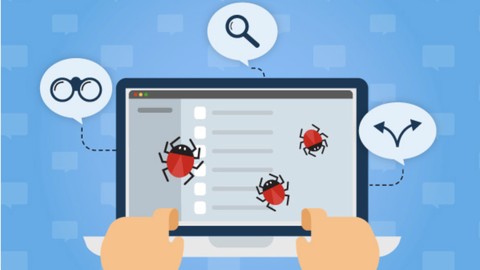
Master software testing – from zero to Hero QA – 2024
Master software testing – from zero to Hero QA – 2024, available at $94.99, has an average rating of 4.31, with 43 lectures, 11 quizzes, based on 166 reviews, and has 784 subscribers.
You will learn about Learn software testing best practices in software development life cycle How to write test documentation (STP, STD, STR) – best practices Gain practical experience of writing QA documentation and testing How to test web applications How to test mobile applications Bug life cycle What is agile methodology and where do manual testers fits in What is micro-services and monolith and how they affect our testing How to succeed QA manual job interviews Learn QA practical and theoretical best practices and methodologies Creating a professional LinkedIn profile Get all future course updates for free! Real Life Examples with practical assignment and Quizzes NEW! Using ChatGPT for QA testing activities! This course is ideal for individuals who are Beginners who wants to start their career in Software Testing field or Experienced QA tester – to refresh testing basics and techniques and gear up for Certifications in Software Testing or Developers who want to improve their testing skills It is particularly useful for Beginners who wants to start their career in Software Testing field or Experienced QA tester – to refresh testing basics and techniques and gear up for Certifications in Software Testing or Developers who want to improve their testing skills.
Enroll now: Master software testing – from zero to Hero QA – 2024
Summary
Title: Master software testing – from zero to Hero QA – 2024
Price: $94.99
Average Rating: 4.31
Number of Lectures: 43
Number of Quizzes: 11
Number of Published Lectures: 43
Number of Published Quizzes: 11
Number of Curriculum Items: 58
Number of Published Curriculum Objects: 58
Original Price: $34.99
Quality Status: approved
Status: Live
What You Will Learn
- Learn software testing best practices in software development life cycle
- How to write test documentation (STP, STD, STR) – best practices
- Gain practical experience of writing QA documentation and testing
- How to test web applications
- How to test mobile applications
- Bug life cycle
- What is agile methodology and where do manual testers fits in
- What is micro-services and monolith and how they affect our testing
- How to succeed QA manual job interviews
- Learn QA practical and theoretical best practices and methodologies
- Creating a professional LinkedIn profile
- Get all future course updates for free!
- Real Life Examples with practical assignment and Quizzes
- NEW! Using ChatGPT for QA testing activities!
Who Should Attend
- Beginners who wants to start their career in Software Testing field
- Experienced QA tester – to refresh testing basics and techniques and gear up for Certifications in Software Testing
- Developers who want to improve their testing skills
Target Audiences
- Beginners who wants to start their career in Software Testing field
- Experienced QA tester – to refresh testing basics and techniques and gear up for Certifications in Software Testing
- Developers who want to improve their testing skills
Embark on a Successful Career in Software Quality Assurance (QA)!
Software Quality Assurance (QA) is a vital process that runs parallel to software development, focusing on enhancing the development process to prevent issues before they escalate. As an umbrella activity, QA is applied throughout the software lifecycle.
Benefits of a QA profession:
-
QA ensures high-quality software, saving time and cost.
-
Improved reliability and reduced maintenance over time.
-
Enhances commercial software quality, increasing market share.
-
Drives continuous improvement in the software creation process.
Course Requirements:
-
Motivation and willingness to learn new concepts.
-
Think big and embrace continuous learning.
Who this course is for:
-
Beginners seeking to start their career in Software Testing.
-
Experienced QA testers looking to refresh their skills and prepare for Software Testing Certifications.
-
Developers aiming to gain testing expertise.
Why become a QA?
-
Fascinating work that makes you an expert on the product.
-
Constant learning and growth in your skill set.
-
Expanded thinking and problem-solving abilities.
-
Attractive average salaries ranging from $70,000 to $110,000 without specific degrees or certifications.
Course Highlights:
-
Suitable for all experience levels, from novices to seasoned QA professionals.
-
No technical expertise required to excel in QA testing.
-
Gain confidence in becoming a skilled tester.
What you’ll learn:
-
QA best practices, testing types, and methodologies.
-
Proper QA document writing and defect reporting.
-
Testing Web and Mobile applications.
-
How to use AI – ChatGPT for testing.
-
Utilizing Jira, Docker, and SQL for testing.
-
Understanding Agile and software development phases.
-
The impact of software architecture on testing.
-
Tips for landing your first QA job.
-
Recommended tools for software testing.
What you’ll receive:
-
Over 9 hours of valuable and extensive content.
-
Ongoing support via email for any assistance or concerns.
-
Highly recommended tools for software testing.
-
Regular updates with the latest innovations and best practices.
-
Life-long assistance through Q&A.
-
Practical sessions, quizzes, and hands-on assignments to reinforce learning.
-
Job interview questions and practical guidance for job hunting in QA.
Join our course and take a significant step towards a rewarding and fulfilling career in Software Quality Assurance!
Enroll now and unlock your potential as a qualified tester!
Course Curriculum
Chapter 1: Introduction to the course
Lecture 1: Course introduction
Lecture 2: What is software QA testing
Lecture 3: Is software QA testing the right fit for me?
Lecture 4: How to Follow this course?
Chapter 2: Why Testing Is Necessary
Lecture 1: Seven Testing Principles
Lecture 2: Testing pyramid
Lecture 3: The different roles in hi-tech
Chapter 3: Agile and software development life cycle
Lecture 1: What is software development life cycle (SDLC)
Lecture 2: Software development methodologies
Lecture 3: Agile & Scrum methodologies
Chapter 4: QA testing types and techniques
Lecture 1: Why we need testing types and techniques
Lecture 2: Test Levels
Lecture 3: Testing types and techniques – part 1
Lecture 4: Testing types and techniques – part 2
Chapter 5: QA testing Documentation
Lecture 1: Why Do We Need Test documentation
Lecture 2: What is SRS
Lecture 3: Software Test Plan (STP)
Lecture 4: Software Test Description (STD)
Lecture 5: Software Test Report (STR)
Lecture 6: Writing Test Case
Chapter 6: Bug tracking life cycle
Lecture 1: Defect life cycle
Lecture 2: How to write a bug report
Chapter 7: Testing Web Applications
Lecture 1: How to test web applications – part 1
Lecture 2: How to test web applications – part 2
Lecture 3: Dev Tools for QA testers (F12)
Chapter 8: Testing Mobile Applications
Lecture 1: Introduction to mobile applications
Lecture 2: How to test mobile applications
Chapter 9: How to use Jira
Lecture 1: Sign up to Jira
Lecture 2: Jira overview
Chapter 10: How software architecture affects our testing
Lecture 1: How software architecture affects our testing
Chapter 11: SQL for testers
Lecture 1: Intro to databases
Lecture 2: SQL for testers
Chapter 12: Intro to Docker
Lecture 1: Docker installation
Lecture 2: What is docker
Lecture 3: Docker Cheat Sheet
Chapter 13: Finding QA position
Lecture 1: Job Interview tests to practice
Lecture 2: Recommend steps to finding a job in QA
Lecture 3: Creating a professional LinkedIn profile
Chapter 14: Extra QA tips!
Lecture 1: Recommended online paid bug hunting sites
Lecture 2: Recommended tools for QA testing
Chapter 15: AI for QA [NEW]
Lecture 1: ChatGPT for tester
Chapter 16: Course Summary
Lecture 1: Congratulations!
Lecture 2: Whats next?
Instructors
-

Sarit Vakrat
Director of quality & Eng Ops
Rating Distribution
- 1 stars: 3 votes
- 2 stars: 2 votes
- 3 stars: 20 votes
- 4 stars: 48 votes
- 5 stars: 93 votes
Frequently Asked Questions
How long do I have access to the course materials?
You can view and review the lecture materials indefinitely, like an on-demand channel.
Can I take my courses with me wherever I go?
Definitely! If you have an internet connection, courses on Udemy are available on any device at any time. If you don’t have an internet connection, some instructors also let their students download course lectures. That’s up to the instructor though, so make sure you get on their good side!
You may also like
- Digital Marketing Foundation Course
- Google Shopping Ads Digital Marketing Course
- Multi Cloud Infrastructure for beginners
- Master Lead Generation: Grow Subscribers & Sales with Popups
- Complete Copywriting System : write to sell with ease
- Product Positioning Masterclass: Unlock Market Traction
- How to Promote Your Webinar and Get More Attendees?
- Digital Marketing Courses
- Create music with Artificial Intelligence in this new market
- Create CONVERTING UGC Content So Brands Will Pay You More
- Podcast: The top 8 ways to monetize by Podcasting
- TikTok Marketing Mastery: Learn to Grow & Go Viral
- Free Digital Marketing Basics Course in Hindi
- MailChimp Free Mailing Lists: MailChimp Email Marketing
- Automate Digital Marketing & Social Media with Generative AI
- Google Ads MasterClass – All Advanced Features
- Online Course Creator: Create & Sell Online Courses Today!
- Introduction to SEO – Basic Principles of SEO
- Affiliate Marketing For Beginners: Go From Novice To Pro
- Effective Website Planning Made Simple




















